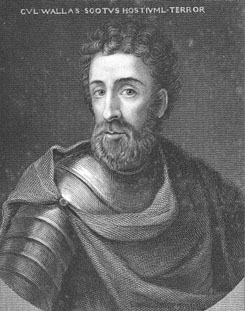 |
| William Wallace (http://www.nndb.com/) |
"Tell your people that we have not come here to gain peace, but are prepared for battle, to avenge and deliver our country." These words of Sir William Wallace rang in the ears of the English commander as he ordered his troops to cross the bridge that separated the Scottish army from the English army. Silently, a small army of true Scotts patiently waited on the other side of the river as they watched thousands of enemy English troops, eventually numbering 5,500, march across the extremely narrow bridge. Finally, Wallace gave the order that allowed his men to put a stop to this group of English tyrants' aggression. Through brilliant tactics and the use of the local terrain features, Wallace maneuvered his men into positions that prevented any further movement of the English. Ultimately, the Scotts snatched away what should have been an easy English victory, defeating both England’s army and its pride. Sir William Wallace, along with Andrew Murray, led this attack known as the Battle of Stirling Bridge. Sadly, Murray died a few weeks after from wounds that he received during the battle, but the once outlawed Wallace became the Guardian of Scotland. The incredible life of Wallace demonstrates how God uses seemingly insignificant people to perform great tasks.
Born into a poor family, no one would have dreamed how great William Wallace would become. He was studying to become a priest when, at age nineteen, his world turned upside down An English knight named Fenwick mortally wounded his father, fueling an intense passion to put an end to the English injustices. From then on, Wallace became a major aggravation to the English as he and his band of fifty men raided towns, attacked small bodies of troops, and overtook small castles. In one of these enterprises, he succeeded in avenging his father by slaying the knight who killed his father. Nevertheless, Wallace remained one of the few patriots left still fighting for freedom, because most of the other nobles allowed England to trample the land in order to gain favor with the English and save their own lives.
As Wallace’s successes became known to the people across Scotland, the English feared him more, but these successes came at a cost. In one of his street skirmishes, he became heavily pressed by English, whose confidence grew as they thought this their chance to kill this menace. Wallace’s mighty sword did wonders, but such a small group of warriors could do relatively little against hundreds of soldiers. Through the chaos of the fight, he heard his wife Marion’s beckoning voice call him through an open door in one of the nearby houses. He slowly made his retreat under the cover of the house where, even though he escaped, his wife was not so fortunate. The infuriated governor and his men burst through the door and took Wallace's wife from him. This spurred Wallace on to one of his most daring endeavors ever, where he stormed the town of Lanark, completely overtaking it. After this, Wallace's small following rapidly grew into an army of patriots who shared the same passion of liberating their dear country.
With his growing numbers of men, Wallace made bigger and bolder attacks on the enemy. So great was King Edward’s dismay when he heard that the Scotts had rebelled that he gathered an army of fifty thousand men and sent them to Scotland to crush the rebellion once and for all; however, the army did not meet with such success as the King had hoped. In the Battle of Stirling Bridge, the Scottish army routed the English, and the remainder of the army retreated back to England. After this embarrassing defeat, the king of England personally led an army twice the size of the last. The Scottish army, led by their brilliant commander, refrained from meeting such a massive army in pitched battle but used other methods such as burning all of the crops and driving away all of the food in front of the English army. The Scotts knew that they would eventually have to fight them, and Wallace considered fighting a half-starved enemy better than delaying and fighting them later. The outcome of this decision resulted in the battle of Falkirk where, due to the treachery of the cavalry commander, the Scotts fared badly. Wallace’s men were left alone to face Edward’s one hundred thousand men where sadly, the English defeated the Scotts.
Wallace did not thirst for power like many others but led and fought solely for the freedom of the country that he loved so dearly. He knew that there was now no hope for the freedom of Scotland unless he could find someone who was more influential to lead the army and convince all of Scotland’s nobles, who remained aloof from the fight, to join the cause. Wallace targeted Robert the Bruce as the best choice. As Wallace sought to get the help of Bruce, a disloyal Scottish knight betrayed him into the hands of the English, where he suffered a most cruel death. Although initially perceived as a tragedy for Scotland, William Wallace’s death actually fueled the fire for freedom in the hearts of the true Scotts that eventually restored peace to the land and established Bruce as the king of Scotland. We remember Wallace today as a great leader and a man whose courage and love for his country accomplished things far beyond what anyone could have imagined. His men loved him because he took care of them, and he always presented an example worth imitating. Although Wallace failed in his attempt at personally freeing Scotland, he inspired a passion for freedom in many Scotts’ hearts, eventually leading to ultimate liberty from the English yoke.
Page created on 5/30/2010 12:00:00 AM
Last edited 5/30/2010 12:00:00 AM
